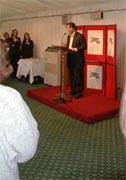Salt - The forgotten element 2002
Objective
To educate the public on the importance of reducing salt in the diet and how this can be achieved in a practical way.
Special emphasis of Salt Awareness Day 2002
Practical ways of reducing salt in the diet.
How children’s diets contain increasing amounts of salt.
How a healthy eating diet is not always low in salt.
Messages
A high salt diet is linked to rising blood pressure and stroke.
There are other health benefits of reducing salt in the diet, namely reducing the risk of osteoporosis and gastric cancer.
There are several ways of reducing salt in one’s own diet, namely by not adding salt at the table and during cooking, but more importantly to try and reduce consumption of high salt processed foods.
How to understand the labelling of salt in bought foods.
Children tend to eat a particularly salty diet but are less able to cope with excess salt than adults.
The public need to be made aware that most of the salt they consume is from processed food they buy and 1/4 of the current intake comes from bread.
A so-called ‘healthy diet’ can still be high in salt. Lowering salt in the diet tends to be the forgotten message as far as healthy eating is concerned.
Raymond Blanc, celebrity chef, spoke on how he has ‘converted’, to lower salt cooking and the practicalities of trying to achieve this in the day to day running of his work.

MP Kerry Pollard welcomes guests

Celebrity chef Raymond Blanc talks about Salt and the weapon in the kitchen


Professor Graham MacGregor talks about salt and its effect on your health


